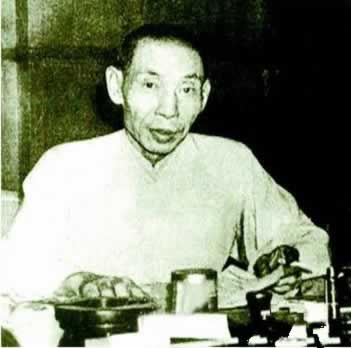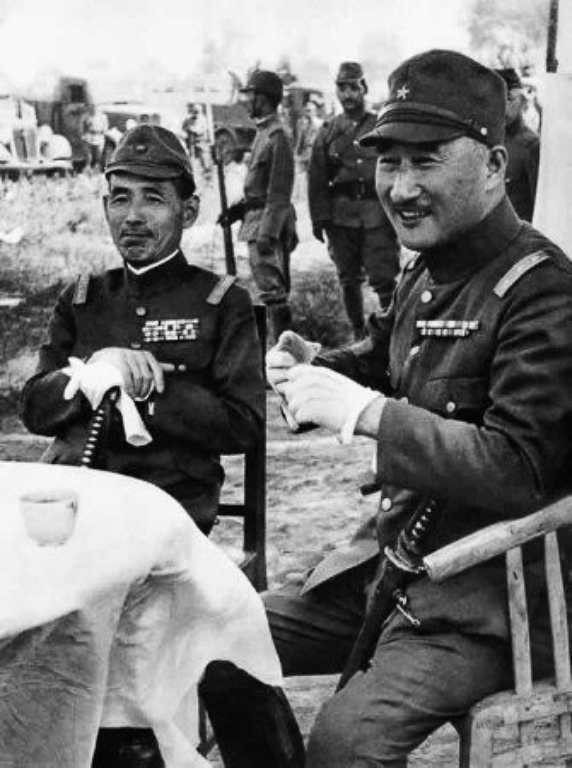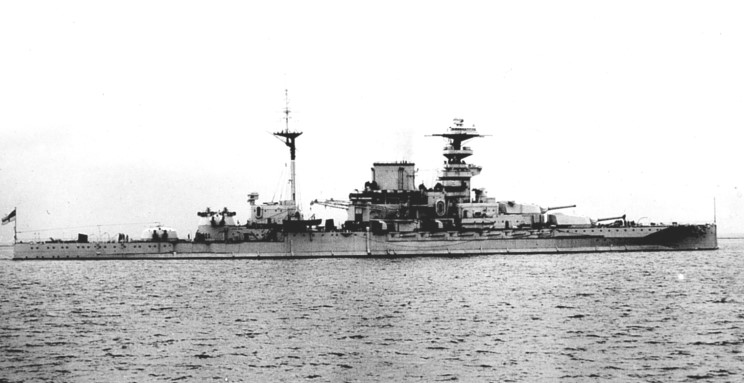I promise everybody that after this update, we will have a little less exposition, and a lot more explosions.
---
Generals Shunroku Hata (L) and Count Hisaichi Terauchi (R). They're pretty big players in the TTL IJA, and I realized I hadn't shown a picture. Note campaign ribbons do not correspond to TTL campaigns; I'm not good with Photoshop.
Marshal-General Baron Nobuyoshi Muto:
Hsinking, Manchukuo
January 21st, 1941
7:10 AM
GENERALS Hideki Tojo and Hajime Sugiyama stood on the tarmac on a cold winter morning, their collars turned up against the cold. They were awaiting the arrival of Baron Nobuyoshi Muto, the Japanese ambassador to Manchukuo and Tojo's predecessor as commander of the Kwantung Army. Even at 72 years old, he remained sound of mind and body. Widely respected in military and civilian circles, he also held the coveted rank of Marshal-General, the most senior rank possible in the Imperial Japanese Army.
The cold was absolutely biting this morning, making the wait seem even longer
"It could be worse" said Sugiayma. "Did I tell you what was in yesterday's army news bulletin? You wouldn't want to be in Ushiroku's boots today."
"Why is that?" inquired Tojo
"The Imperial Conduct Order. General Ushiroku of the Central China Area Army found out that the Colonel of one of his regiments, Isamu Cho, turned a blind eye to some of his men raping villagers. Two of them were even caught with opium."
Tojo's expression become deathly serious.
"Naturally" continued Sugiyama "Ushiroku was furious when he found out. He had the
kempeitai on the regiment like a swarm of wasps. They found thirteen privates, two corporals and a sergeant responsible. They were strung up in the middle of the village, with the villagers and the rest of the regiment watching. Every officer in the regiment was either broken in rank or dismissed entirely, and the men scattered to other regiments. Then, after making him watch, they strung Cho up too. Ushiroku called him a stain on the Army, and his family's honour."
"We're this short of men, and they can afford to do that?" Tojo thought out loud. "I agree with the sentence, though. You must cut rot out, and enforce standards consistently. Those warlord armies would never enforce discipline like that. Cho was no damn good anyway; a hothead. I even knew about that here."
At last, the plane landed. The steps were brought up, and five men deplaned.
Hata was the first, and he introduced the rest of the men. He and three others wore the new
ichi-shiki (Type 1) Army uniform, their fur overcollars turned up and their high forage caps atop their heads. The fourth man was a short, rotund figure in a double-breasted civilian overcoat and a grey
ushanka.
"General Tojo! General Sugiyama! Good morning. It is my pleasure to introduce Marshal Baron Muto, although I am aware you are already familiar. Today, we are accompanied by two members of my staff, Lieutenant Colonel Baron Nishi, an expert in cavalry tactics, and Captain Wakasugi, Prince Mikasa. We are also accompanied by Doctor Sato of Unit 731 in Harbin, who will share with us some of the scientific research he is engaged in"
Prince Mikasa was none other than Takahito, the Emperor's youngest brother, only twenty-five years old.
Tojo and Sugiyama shook hands with the men, and as they did, Tojo could not help but feel a slight pang of self consciousness.. Baron Muto, in particular, cast an impressive sight. He wore the Marshal's version of the new uniform, as denoted by the ermine overcollar (the other officers wore overcollars of wolf fur) and decorated sword grip exclusive to his rank. Tojo's worn
senbou cap and the frayed spot on his coat felt immediately obvious to him.
Today was set to be a busy day. They would first meet with Prince Regent Pujie, who would sign a Defence Authorization Act in their presence, a compromise brokered by the Prince Regent, Prime Minister Zhang and Ambassador Muto. Thereafter, they would review the Manchukuo Imperial Army.
They piled into warm and waiting staff cars, and the motorcade split up- Sugiyama, Nishi and Wakasugi headed towards the Kwantung Army HQ, while Muto, Hata, Tojo and Sato carried on to the Salt Tax Palace.
---
Salt Tax Palace
Hsinking, Manchukuo
January 21st, 1941
9:00 AM
PRINCE Regent Pujie stood still in the entrance as his wife, Lady Hiro Saga, straightened his tie. He wore a conservative morning suit, attire appropriate for such an important meeting. Lady Saga wore an elegant Western style dress.
Prime Minister Zhang waited in the office, preparing some additional papers.
Pujie had been Prince Regent for only three days, but he was already easing into the role. In an elegant compromise brokered by Baron Muto, Puyi agreed to temporarily abdicate for health reasons, and went with Wanrong to a sanatorium in Macau. His last act was to appoint Pujie as his Regent. Today was a big day, as Ambassador Muto had also helped broker a compromise for the Defence Authorization Act that Puyi had refused to sign.
The Salt Tax Palace was also a hive of activity. It was fumigated for the infestation of insects that Puyi and Wanrong had caused, and the damage they had caused to the Palace was being repaired as well. To the staff's delight, Pujie's first act as Prince Regent was to ban corporal punishment for the Palace staff, and henceforth, nobody would be "taken downstairs" ever again.
"You look very handsome" said a smiling Lady Saga. "I have nothing but confidence in you"
"It is you who made this all possible" replied a smiling Pujie.
At that moment, the cars pulled up.
A butler opened the door, as Muto and the rest of the entourage entered. The Prince Regent and Princess Consort bowed.
"Your Imperial Highnesses" said Muto "I thank you for your hospitality. It is my great pleasure to introduce General Shunroku Hata, Inspector General of Military Training of the Imperial Japanese Army, General Hideki Tojo, Commanding Officer of the Kwantung Army, and Doctor Sato, Deputy Research Director at Unit 731 in Harbin"
"Welcome" said Lady Saga. "Allow us to take your coats. If you would like some refreshments or require anything, do not hesitate to ask. I am sure you have much to discuss, so I will take up no more of your time"
As they walked towards the Prince Regent's office, a repairman caught Tojo's eye. He was buffing out a scrape in the floor, in the exact spot that the ashtray Wanrong threw at him landed. The repairman, presumably a veteran, stood up and saluted as the entourage passed, and the officers acknowledged. Tojo could not be more surprised at the difference in the receptions now and two weeks ago.
The five men joined Prime Minister Zhang in the Emperor's office, around a meeting table that had been set up. The Prince Regent opened the meeting.
"The first order of business today, as the Prime Minister and Ambassador have been briefed on, is the Act renaming the city of Mukden to Shenyang. This will be done to emphasize the inter-racial cooperation that is the hallmark of Manchukuo and to put into the past certain unfortunate associations with the old name. Mr. Prime Minister, please sign here, and when the meeting concludes, please see to it that the Post Office and South Manchukuo Railway are made aware of this change."
Zhang and Muto signed it, while Tojo looked on, duly impressed with the new Prince Regent.
"Now" continued Pujie "To attend to the matter that brings you gentlemen here today, the amended Defence Authorization Act. I have been briefed on it, and given my input. As drafted by Ambassador Muto, it will allow the Imperial Japanese Army to commandeer certain units of the Manchukuo Imperial Army. Volunteer units may be deployed outside the current borders of Manchukuo, while conscripts must remain in Manchukuo unless they volunteer for extraterritorial service. It will also allow the formation of additional volunteer units, to be funded and equipped by the Imperial Japanese Army. This, I believe, is a fair compromise, which balances the rights of the citizens of Manchukuo with defence requirements. General Tojo, do you have any additional input, before signing commences?"
Hata looked on and nodded with approval, clearly impressed. Tojo was visibly surprised by the difference.
"None, Your Imperial Highness. I am duly impressed with your great effort to make such an Act possible."
"Very well then" said Prince Regent Pujie "We will begin"
The Prince Regent signed it, followed by the Prime Minister, and the Ambassador, Hata and Tojo signed as witnesses.
Tojo, although he was pleased with the additional powers, realized the damage that this would do to his reputation. He was unable to get Emperor Puyi to consent to such an act, and it required Muto, who outranked him as a soldier and a diplomat to do it. His victory in Manchukuo would have to be a great one if he was ever to get a political appointment or a Marshal's badge.
After signing was completed, Dr. Sato began his presentation. The short, rotund man, with his coat and hat removed revealed a shiny bald head, a well-fitted grey double-breasted suit. He brought with him a large valise.
"Your Imperial Highness" he began. "It is my great pleasure to present the great discovery I and Unit 731 have made to you and the Army staff today. It is also my humble request, that you provide me with some subjects and a control group for further research" said Sato.
"Before I agree" said Pujie "I will have to see the nature of your research"
"Yes, yes, of course" said Sato, with great excitement, as he opened the valise.
"My name is Doctor Akira Sato, and I am the only Japanese man who holds dual doctorate degrees in chemical engineering and podiatry!" He pulled a vial containing a greenish liquid, another with a bluish-white powder and a pair of insoles from the valise. "Now, gentlemen! How does an Army march? Why, on its feet, of course! That is why I have developed the 'Sato System'; a method of protecting soldiers' feet in an economical and practical manner which utilizes existing footwear! This liquid you see here is a waterproof sealant which maintains an excellent bond with rubber, and natural or synthetic leather. The insoles you see here are a high-density foam rubber compound which reduce fatigue on the feet and are quick-drying and odour resistant. The powder, and this is my proudest discovery- it destroys odour and bacteria, yet is completely non-toxic to humans! Why, it is safe enough to eat! If you would like a-"
"That..." said Pujie, trying to suppress a laugh "will not be necessary, Doctor Sato. How have the efforts to increase production of the BCG-type tuberculosis vaccine progressed?
"They have encountered delays, but are now progressing well" said a slightly annoyed Sato, eager to change the subject back to his discovery.
In the end, the boot sealant was approved, the powder rejected, and the insoles green-lighted for further research using non-strategic materials only.
The presentation concluded, the Prince Regent and his entourage departed the Palace for the Kwantung Army Headquarters, where a parade took place and Pujie took the salute from the Manchukuo Imperial Army, followed by a detailed inspection.
The day was punctuated by more good news from Hata- the Navy, having phased out the Type 95 25mm Anti-Aircraft Gun as it adopted the Type 99 and began trialing the Bofors gun, transferred the older, surplus pieces to the Army, presumably by the edict of one of the many efforts to reduce inter-service rivalry. French expatriate engineers from Hotchkiss and Schneider et Cie. were employed to develop a faster-traversing mount. The Kwantung Army would share first priority for the pieces with Count Terauchi's Northern China Area Army.
Although much work remained to be done, it appeared that Manchukuo's fortunes were improving.






